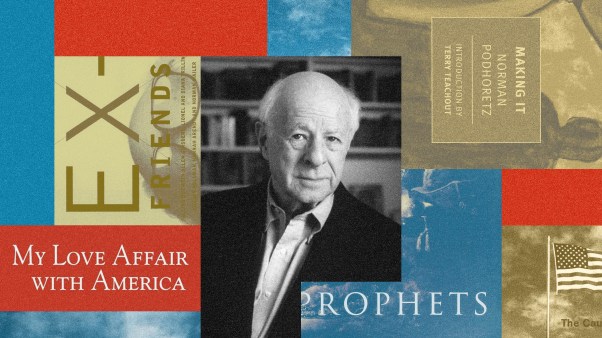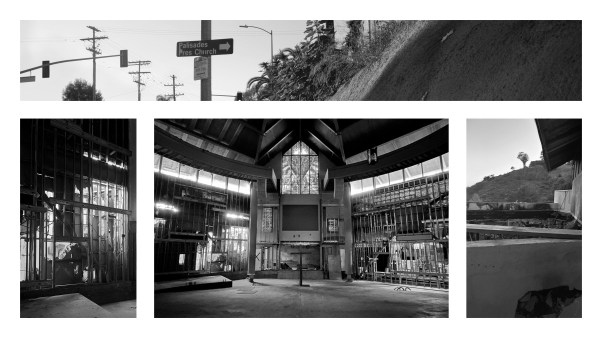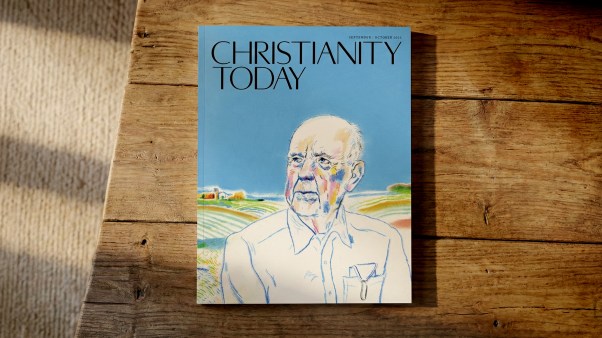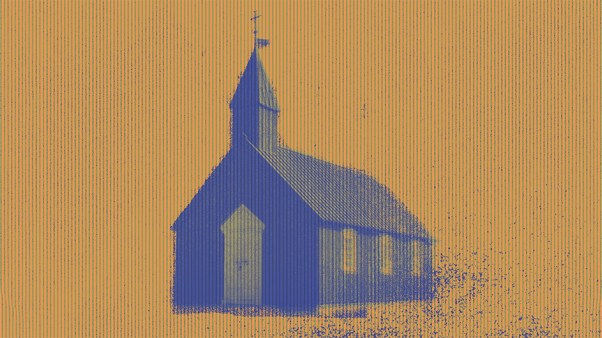I was feeling poor. Not poor in spirit. Just poor. Once the bills were paid, we had $2.94 in checking. It was only Tuesday. And to deepen my melancholy further, this was going to be a two-funeral week.
My wife, Joy, had taken a temporary job so we could buy a sump pump after our basement flooded. We needed baby sitters while I hung out at two funeral homes. I estimated 30 bucks. Plus the dry cleaner was holding her wardrobe hostage. Joy had dropped off a load of dresses. This job required her to look spiffy.
We had paid a deposit for my son and me to attend the “Lads and Dads” retreat. I needed another $60 by Friday when we would jump in the car and head for Bambi Lake. I was looking forward to that, but all in all, I figured we were about $180 in the hole.
We starting rationing cereal.
Their suffering and mine
A friend watched our kids while I went to help the family decide those dreadful details—what color casket he will look good in, which poem to print in the memorial program, and whether to buy the vault that seals or the one that would benefit from a sump pump. (They almost always choose the one that seals.)
I arrived at the funeral home a little late and very overdressed. The family was in blue jeans. Even the funeral director had shed his jacket. He was seated behind a little desk in a 10-by-12 room packed with sons, daughters, their wives and husbands, and Madge, the distraught widow, front and center. Madge had called me to ask if I’d perform the ceremony. Her family had connections to the church.
A plump woman in her late fifties, Madge had a prominent nose, made even more so by eight hours of overblowing. If the tissues she was grabbing, wadding, dabbing, and tossing were cigarettes, we would have called Madge a chain smoker.
Gary, the director, said, “Welcome, Pastor. We just got started and are going over a few details.”
He outlined each decision, pausing politely as the family conferred, writing their selection on the appropriate line on his planner. After each question, Madge broke forth in a sing-song of sobs and half-words.
Gary touched the keys on his calculator like a pianist playing a tender passage from Chopin. It had never occurred to me that even a touch on a calculator could send the wrong message. It wouldn’t do for the man to be banging away on an adding machine, cranking the handle down after each figure: “Services rendered”—ch-ching. “Building for viewing”—ch-ching. “Hearse and limo”—ch-ching.
Gary turned the calculator around and gently slid it two inches closer to the edge of his desk. Everybody leaned toward the desk, eyes zooming on the total. As one, they inhaled.
Then, in a voice soothing and almost apologetic, Gary asked the all important question: “Did your husband have insurance?”
Madge erupted again.
I took that as a no.
With some skillful interpretation from the daughter on Madge’s left, it was determined that her husband would receive only the standard factory worker’s death benefit: $750. Social Security would kick in an additional $250. I felt genuinely sorry for this brave family.
Precisely two seconds later the less-than-noble thought struck me: I bet I won’t even get twenty bucks for this one.
Judging the book’s cover
I quickly put aside such nonsense and turned my attention to Madge. At least she had strong kids to carry her through this ordeal. I was especially impressed with her son. He appeared to be a pillar of strength: muscle shirt, tattoos, pony tail, and skin tanned as leather from working outdoors. A roofer, I guessed, strong enough for the whole family to lean on.
The kids trooped upstairs to the casket showroom. They milled about for ten minutes, looking at metal and wood, feeling crepe and linen, checking out the price tags. If there were tires under there, they’d probably kick ’em.
They chose a nice mid-range, 14-gauge steel model that would bring out the color in their father’s hair, a sort of brownish gold.
Then I had a chance to talk to the family. It had been years since Madge had visited our church, and I couldn’t remember her last name. Her husband went by a nickname.
“He started smokin’ at age seven,” said one of his daughters. She spoke those words like they were listed under the “accomplishments” column on his resume. I wrote “Smokey” in my notebook, and reminded myself to check the obituary later.
We write our own eulogies
With the decisions made, Madge passed out hugs all around, including a long, bone crushing embrace for me. I found myself reaching for the doorjamb to steady myself before she let me out of her grip.
We left the funeral parlor, they to mourn, and me to figure out what I could say about Smokey. They hadn’t given me a lot to go on. “Did he graduate from college?” No. “High school?” No. “Grade school?” No. “Favorite music?” Country.
Smokey worked at the factory, twelve hours a day, seven days a week, fifty weeks a year, I gathered, until his health gave way and he took early retirement. In his off hours, he smoked and slept. And I had the distinct privilege of eulogizing him.
But that would have to wait until Friday.
George’s service on Wednesday went well, as funerals go. At least it was uneventful: 92 years of clean living leaves little to regret.
If there was ever a time I could be happy to do a funeral, this was one. I knew George. He had attended my church for many years, and I knew stories about him. And I knew about the disposition of his soul.
He had left a strong legacy in his family, who genuinely celebrated his graduation into eternal life, where they were certain he was living in God’s presence. There was no doubt about George.
With funerals like these, a minister walks away thinking, I might have done somebody some good today.
I didn’t even worry about the honorarium. The director told me George’s wife said she would send something in the mail as soon as the estate was settled. I was glad to oblige, although I did wonder how we were going to pay the sitter and get my wife’s clothes out of hock.
Not so holy smoke
With funeral number one behind me, I turned my thoughts toward Smokey and his Thursday evening visitation. Normally at these gatherings, tones are hushed. Handshakes are short. People pause briefly at the casket, then retreat to a corner where they can whisper, as though the person in the casket might overhear and rise up to correct some misinformed gossip.
Not this time.
I walked into an almost empty room. Three lonely souls were huddled, seated. The place was dead quiet.
I approached the deceased. The daughter was right. The casket matched Smokey’s hair. And also the tobacco-stained fingers that held an unlit cigarette.
Then it dawned on me where the others might be. Passing the funeral director in the hall, I said, “Gary, you might want to inform the family that cigarettes are not considered, well, an honorable tribute for a person lying in state.” I smiled sheepishly and held out two fingers in the shape of a V in front of my chest.
His eyes first widened, then closed as he caught my meaning. He shook his head and sighed. “Thank you, Reverend. I’ll take care of it.”
I followed my hunch down the hall to the stairs. A tell-tale scent grew stronger as I got closer. As I descended to the basement, toward the coffee pot and the comfortable chairs, the smell grew so strong I stifled a couple of coughs. Downstairs, my head brushed the ceiling level of their underground hideaway. The smoke was so thick I squinted to see the forms of people.
I threaded my way through the crowd to the woman at the other end of the room, the one clenching the bouquet of tissues. When her daughter tapped her on the shoulder, Madge wheeled around, threw her arms around me, and cried, “Oh Pastor, thank you for coming.” And we wrestled for our balance again, as we had done the day before.
I shook hands with a few family members and I hiked upstairs, half holding my breath. Darting into the men’s room, I turned on the fan and gulped three or four long, wonderful breaths of fresh air. On my way out, I decided to take one last peek into the visitation room. Smokey, for the first time in his natural life—or at least since age seven—was without a cigarette. I felt like a tattletale.
Heed the two-minute warning
The first thing that struck me the next morning was how nice the strong son looked. He was wearing a suit. I did a double take. He turned his head, and I could see the pony tail. Yep, it was him.
Smokey had told his family, “No tie. I ain’t never wore one alive and I sure ain’t going to wear one dead.” So, it was really a tribute for the roofer son to dress up while the man in the casket wore a western-style shirt.
Gary approached me about ten minutes before service time and with characteristic diplomacy asked, “About how long will the service be today?”
I knew he was saying, “We’ve got a double header, so keep it short.”
“Twenty minutes, tops,” I said, smiling. He looked relieved. I leaned slightly closer and confided, “I didn’t know this fellow very well, and the family didn’t give me much to go on. Besides, most people don’t hear much of what I say anyway.”
He patted me on the shoulder. “You’d be surprised how many ministers don’t realize that.” I liked Gary.
Then he opened up a bit more. “Funny, isn’t it, how the ones who hardly darken the door of a church suddenly get real ‘spiritual’ when they need somebody to say nice things at a funeral.”
I nodded.
Without skipping a beat, Gary said, “I’ve got another funeral today at two o’clock, so I’m trying to gently move things along. It’s going to be tight.”
“We’ll get you back on time. Besides, I’ve got a promise to keep. My son and I are going to the lake this afternoon.”
Gary visibly relaxed, and then leaned even closer to me as he said, “I think we may have a difficult time getting the family out of the room after the service.”
“Oh? Are there some who will have a hard time letting go?”
“Yes. The son for one. He had a nasty falling out with his father and hasn’t spoken to him since. He had five years to make it right, but they were both so stubborn that neither budged an inch.”
Gary looked at his watch. One minute ’til eleven. I remembered that I had not picked up the little memorial program that included the loved one’s obituary. I grabbed one off the stand in the hall as Gary motioned me into the room.
I paused at the casket—no cigarette—and stationed myself behind the podium.
Truth stranger than friction
Madge was seated directly in front of me, with her faithful daughter to her left. Next to her sat the roofer son. Traditionally, immediate family sits in the front row, with others behind. Apparently there had been some competition for seating, and various relatives, not to be outdone, had seated themselves as close as possible to the action. One couple crouched on a love seat next to the casket.
I always pray right off the bat, to set the tone for a proper memorial message. “Would you bow your heads with me in prayer?” At this Madge burst out with rib-cracking sobs. Almost everyone had bowed their heads, but not one person had actually shut their eyes. They were all looking at the front row.
I prayed, a little more loudly than usual. By the time I had finished with the first Scripture passage, the one about God being the source of all comfort, I was already preaching as loudly as I normally do in my own pulpit where the back row is forty feet away. Two minutes into the service, the two sisters had already joined their mother in a constant stream of sniffles.
Then came the eulogy. Opening the little program, I put my finger next to Smokey’s legal name and began, “We are here to commemorate the life of Omar Zebulon Baehr.”
My voice caught as I said the last word. The family thought I was deeply moved and so they wailed even more loudly. Actually I was suppressing a belly whopper explosion of a laugh. For the first time since I had met this family, it dawned on me. I was doing the funeral for Smokey Baehr.
“Smokey was a hard-working factory man,” I proclaimed. “He graduated from the school of hard knocks where experience is the best teacher.” Sobs all around.
“He loved country music,” more sobs and a few snorts, “and like the words to that memorable country song, ‘You’ve got some mighty big shoes to fill.'”
That last phrase came to me by way of another funeral I had attended only three weeks earlier. That was fortunate since I didn’t have a clue about country music. The reference really broke up the front row. The pandemonium was louder than a church nursery on Baby Dedication Sunday.
At least the son was strong, steady as a rock. I felt relief that at least one member of this family was going to remain intact.
“And, as God does for us, we must do for Smokey—” The wave of crying crested. “We must remember the best, and forgive the rest.”
That’s when the strong son exploded with sobs that rivaled anything yet heard. “Please, God, forgive me!” he said to himself but clearly audible to the rest of us. “Oh, PLEASE! I’ve messed up. I’ve screwed up so bad. PLEEEEASE God, forgive me!”
I continued reading.
“In heaven,” I shouted, “He shall wipe away every tear from their eyes, (wail) and there shall be no more death, (crescendo) and no more mourning, (louder) or crying, (louder, with moans) or pain.” Total chaos.
The son dragged the floor as his sisters lugged him, like a 220-pound wet noodle, across the front, by the casket, where he paused and wailed, and finally out the side door. Everyone leaned toward the side door where his entire confession was being sobbed out in heaves of remorse.
I decided to throw in one last word of comfort. “God made all our emotions.” I finally had their attention. “And we’ve seen many of them displayed today.”
With all eyes fixed on me, I decided to go for it. “Jesus told a story about two men who went into church one day. One stood up and acted self-righteous. He prayed a prayer that sounded like he was trying to impress everyone.
“The other man, however, fell on his face in the back of the church, crying out, confessing that he was a sinner and in need of help.” Everyone glanced at the side doors, then back at me.
“The man confessed that he had blown it, and he begged God’s forgiveness, even though he must have made a spectacle of himself. And do you know what Jesus said?”
All eyes were focused right at me. All ears strained to hear what I was about to say.
“He said, ‘Which one of these two men went home justified?'” Heads nodded all around. “That’s right. The one who confessed and begged forgiveness.”
I finished: “Like the song says, tears are a language God understands, and if that’s true, and I believe it is, then I can guarantee that He’s been listening today. Let’s pray.” It was amazing. What had once been total confusion was now peaceful, except for an occasional sniffle or two.
The prayer was brief and as I said, “Amen,” I became aware that Gary had opened the side doors, and he was looking at his watch. I checked the clock in the hall behind him. 11:20. Right on the nose.
There shall be showers and blessings
It took nearly thirty minutes to clear the room so the pallbearers could carry the casket twenty feet out the side door to the hearse. Gary looked a little pale.
We finally made it to the graveside. Gary and his assistant were poised, ready to spring into action, should the son catapult himself over the casket. They had done enough of these to know that people will actually try to crawl right into the coffin with their loved one when guilt pushes them beyond rational thought.
I had performed a lot of funerals but none touched me quite like this one. As I opened my Bible to Psalm 23, I thought how wonderful it was that my father and I enjoy a strong relationship. I made a mental note to call him right after the funeral, before I left for the weekend with my son.
After reading the psalm a jet roared overhead, so I nearly shouted, “The Bible says that all who call upon the name of the Lord will be saved. For all of you who accept him personally, you can enjoy a peaceful reunion in heaven, reserved for those who know him.”
At this, the roofer son jumped from his seat and fell over the casket. The wailing was fierce and I hurried to finish. “Let’s pray!” Gary’s exterior was as smooth as the finish on Smokey’s casket, yet inside I knew he must be craving an antacid.
I shook hands with the family members, endured one final bear hug from Madge, and then made my way to the roofer son, who had finally taken his seat. He pulled my head close to his and whimpered, “My family asked me to give you this.” He slipped me a little envelope. I turned red and felt ashamed for even thinking my terrible thought about probably getting only twenty bucks. I slipped the envelope into my Bible and thanked him.
Then in an effort to connect with this distraught fellow I said, “I know God hears and understands.” I walked to the hearse, so the family could remain a moment to say their final farewell. I sat in the hearse for another twenty minutes.
Gary finally slid behind the wheel.
He drove slowly toward the cemetery entrance. Then, after he was on the highway and just out of sight of the crowd, he hit the gas. We made record time back to the funeral home. Two cars were just pulling into the parking lot, family members for the next funeral. I glanced at the clock on the dash. 1:25.
“Gary, it’s been nice working with you. I’ll pray that those rain clouds hold off until about five-thirty.” He grinned, pumped my hand like an old friend, and walked briskly in the back door to hustle around for another service.
The drive to my house is only six minutes, but just around the corner from the funeral home I had a sudden urge to peek inside the envelope. I pulled it from my Bible, opened it, and almost drove the car into the curb as my eyes fell on a $100 bill. That wasn’t all. Behind the bill was a check for $50. Then, behind that was a $20 bill, and behind that was a $10 bill. Evidently the kids had taken a collection. Nothing about this funeral had gone as expected.
We paid the baby sitter, got my wife’s laundry, and put gas in the car. I loaded up my son and our gear, and we took off for the retreat. In the car, I did the math again in my head. One hundred and eighty dollars. I chuckled out loud.
My son asked, “Whatcha laughin’ about, Dad?”
I hugged him close. I was a rich man.
Clark Cothern is pastor of Trinity Baptist Church, Adrian, Michigan. He can be reached at revwrite@aol.com.
Copyright © 2000 by the author or Christianity Today/Leadership Journal. Click here for reprint information on Leadership Journal.









